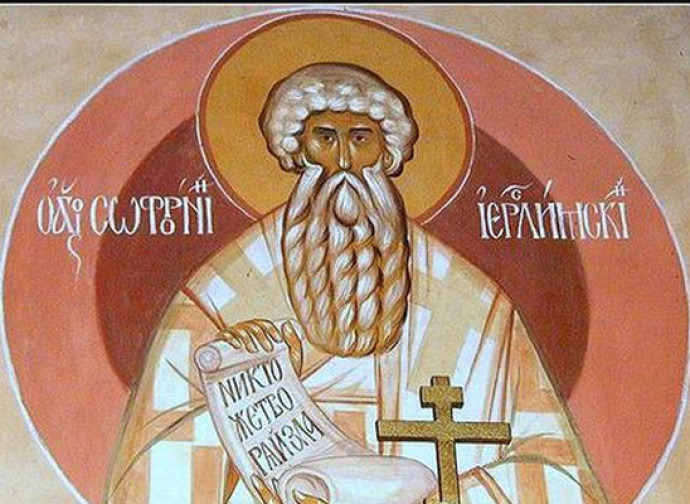Saint Sophronius of Jerusalem
The humble theologian and patriarch Saint Sophronius of Jerusalem (c. 560-638), who had the great merit of denouncing the Monothelite heresy and stood by his flock during the Islamic invasion of the Holy City, was born in Damascus, where early on he showed his talent in his studies.

The humble theologian and patriarch Saint Sophronius of Jerusalem (c. 560-638), who had the great merit of denouncing the Monothelite heresy and stood by his flock during the Islamic invasion of the Holy City, was born in Damascus, where early on he showed his talent in his studies. He travelled extensively from his early youth and soon met Giovanni Mosco, a Byzantine writer and monk, who became his great friend and spiritual guide. Around 580 they travelled together to Egypt, where Sophronius led an ascetic life, studied philosophy and began to have serious eye problems, from which he recovered thanks to the intercession of the Alexandrian martyrs Cyrus and John. Out of gratitude he compiled a collection of 70 miracles attributed to the two saints.
He became a monk in the monastery of St. Theodosius, not far from Bethlehem, and lived there for some time. He then devoted himself to various missions between Asia Minor and North Africa to combat Monophysitism (the heresy that attributed only divine nature to Jesus) and to teach the correct doctrine on the two natures - human and divine - existing in the one person of Christ, solemnly defined at the Council of Chalcedon in 451. Because of the advance of the Persians into Palestine and Egypt, the saint sought refuge in Rome with John Moschus, who died there some years later, in 619, and asked him to bury his body on Mount Sinai or in the Holy Land. Sophronius thus returned to the East and buried his friend at the monastery of Saint Theodosius, during a historical and religious era that was becoming increasingly intricate.
After recovering the Eastern Provinces occupied by the Persians, the Byzantine Emperor Heraclius tried to resolve the rift between the Catholics and the Monophysite heretics, in order to strengthen the unity within the empire. He therefore asked the Patriarch of Constantinople, Sergius I, to find a convincing compromise for both sides. But the attempt to abdicate the truth turned out to be a disaster. In 633 Sergius and Cyrus, Patriarch of Alexandria, developed the concept of Monoenergism, a heresy that maintained the presence in Christ of divine energy alone: in the face of the agreement of the two Eastern patriarchs, Sophronius’ opposition was providential. The saint, who in the meantime had met the younger Saint Maximus the Confessor (whose tongue and right hand had been cut off by the Monothelitic persecutors), became patriarch of Jerusalem the following year and thus acquired even more authority.
In order to overcome Sophronius’ opposition, Sergius worked on another compromise formula (the Ekthesis, issued in 638 in the form of an imperial edict), which replaced Monoenergism with a similar heresy, Monothelitism, which advocated the presence in Christ of the divine will alone, thus denying the co-presence of the human will. Not even Pope Honorius (†638) understood the stratagem, as can be seen from a private letter he sent to the Patriarch of Constantinople, but once again it was Sophronius who defended the true doctrine. Meanwhile, another problem had arisen. The army of Caliph Omar had occupied Jerusalem, continuing the military expansion plan of the new-born Islam (Muhammad had died in 632) in the lands of the “infidels”. To avoid worse consequences and the loss of the right to worship, Sophronius was forced to accept the status of dhimmi for the Christians of the Holy City. At the same time he had instructed Stephen of Dora, making him swear on Calvary, to travel to Rome in his place to warn how dangerous the Monothelite heresy was.
Stephen of Dora kept his commitment and so the Lateran Council of 649 came about, presided over by Pope Saint Martin I, during which Monothelitism was condemned as heresy. The envoy of Saint Sophronius declared: “There he made me promise with a solemn oath: ‘If you forget or despise the Faith which is now threatened, you will have to account to Him who, though God, was crucified in this holy place, when in His next coming He will judge the living and the dead. As you know, I cannot make this journey because of the Saracen invasion. [...] Go without delay to the other end of the earth, to the Apostolic See, the foundation of Orthodox teaching, and tell the holy men who are there not one, not two, but many times what is happening: tell them the whole truth and nothing more. Do not hesitate, ask them and beg them insistently to use their inspired wisdom to make a definitive judgment and annihilate this new teaching that has been inflicted on us’”.
